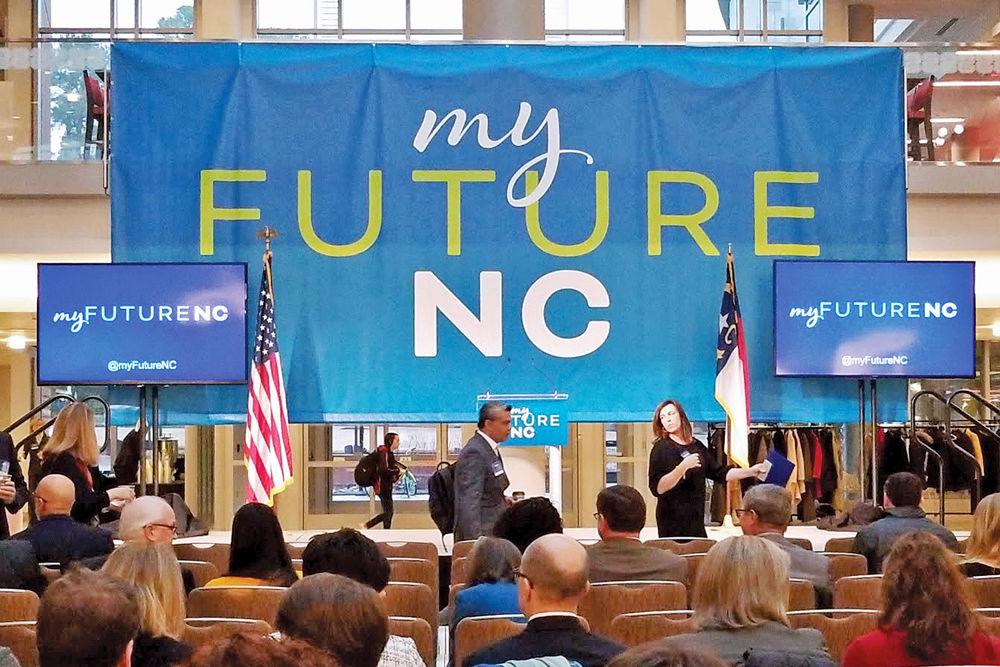On Wednesday, Feb. 20, the My Future NC education commission announced a bold goal to dramatically increase the number of adults in the state with postsecondary credentials by 2030.
Specifically, My Future NC aims to have 2 million 25-44-year-olds in North Carolina with postsecondary degrees or certificates by 2030. The commission is comprised of leaders from a variety of backgrounds, who work toward this goal via education policy reform.
Chancellor Randy Woodson opened the announcement event, hosted in Talley Student Union, by stating that setting a goal is a great motivator for progress.
“Today, we’re here to mark the start of a comprehensive education strategy for North Carolina,” Woodson said. “The My Future NC commission was created a year ago to convene North Carolina’s leaders in education, business and beyond, from every corner of our great state, to set an attainment goal for all North Carolinians.”
Dale Jenkins, co-chair of the commission and CEO of Medical Mutual Holdings, said My Future NC was created because of changes within the job market.
“Today, fewer than half of North Carolinians between the ages of 25 and 44 hold a high-quality postsecondary degree or credential, but the vast majority of newly created jobs require an education beyond a high school diploma,” Jenkins said. “In fact, a recent national survey indicated that over 99 percent of jobs created since the 2009 recession required a postsecondary credential or certificate.”
Jenkins stated that the commission’s goals does not lie exclusively with four-year degrees, but other options, such as an associate degree, are vital for the state’s success.
“We’re not just talking about increasing the production of four-year degrees,” Jenkins said. “That’s important for sure, but there are many excellent jobs available in our state that require associate degrees or a high-quality certificate. The key is simply not stopping your education once you graduate from high school.”
Gov. Roy Cooper was also in attendance and spoke about his goals regarding the future of higher education in the state, how they related to the commission’s and his ideas of implementing policies to make the goal a reality.
“I want a North Carolina where people are better educated, where they’re healthier, where they have more money in their pockets, where they have opportunities to live more abundant and purposeful lives,” Cooper said. “I think this goal helps us to achieve that goal.”
Communicating these efforts is a critical part of this plan, Jenkins said after the event.
“We’ve hired a public relations firm to help us with this, and they’re here today to help us kick off the event,” Jenkins said. “So, we know that there is work to be done. We’ve got a big communication effort on the way, we’ve got to educate people on the goal; what that means, how they can help and why that will help.”
Peter Hans, another co-chair of the My Future NC commission, and Jenkins both said that this will be something the entire state and its representatives rally around. In terms of finding funds to make the goal a reality, there will be ongoing conversations between the education sector, businesses and the government to obtain or allocate already existing funds.
“It will require investment throughout education continually, but I think you’ve seen here today bipartisan commitment to both meeting the goal and forming the strategies that allow us to achieve it,” Hans said.
Hans further elaborated the importance of this approach not only on a statewide level, but on a local and regional level, as well.
“One of the key components here is to engage communities and regions across the state, so that we’ve got statewide goals, but we’ve got county-by-county and regional goals, as well, so that they’re empowered to make decisions in those areas,” Hans said.
Hans and Jenkins said that specific details of the plan and its implementation are still being worked out. Further information can be found on the My Future NC website.








